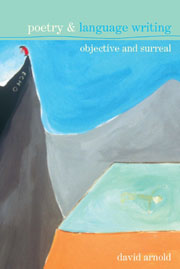Book contents
- Frontmatter
- Contents
- Acknowledgements
- List of permissions
- 1 The Scholarly Life of Language Writing
- 2 Surrealism: An Excommunicated Vessel?
- 3 Under the Sign of Negation: William Carlos Williams and Surrealism
- 4 The Surreal-O-bjectivist Nexus
- 5 Michael Palmer's Poetics of Witness
- 6 Scorch and Scan: The Writing of Susan Howe
- 7 ‘Just Rehashed Surrealism’? The Writing of Barrett Watten
- Notes
- Bibliography
- Index
4 - The Surreal-O-bjectivist Nexus
- Frontmatter
- Contents
- Acknowledgements
- List of permissions
- 1 The Scholarly Life of Language Writing
- 2 Surrealism: An Excommunicated Vessel?
- 3 Under the Sign of Negation: William Carlos Williams and Surrealism
- 4 The Surreal-O-bjectivist Nexus
- 5 Michael Palmer's Poetics of Witness
- 6 Scorch and Scan: The Writing of Susan Howe
- 7 ‘Just Rehashed Surrealism’? The Writing of Barrett Watten
- Notes
- Bibliography
- Index
Summary
I have tried to align my reading of Blues in the previous chapter with the slender but significant section that Marjorie Perloff has cut through first- and second-wave literary modernism. But to keep the coordinates as clear as possible I have deliberately delayed addressing one of her major claims, namely that what is at stake in her new mapping is ‘the nature of the Objectivist experiment’. Perloff specifically has her sights on Louis Zukofsky. She situates Zukofsky's early ‘“Objectivist” poetry’ alongside the kind of Superrealist prose written by Erskine Caldwell and Edward Dahlberg. In challenging preconceptions with this very localized analysis, Perloff is in tune with a recent trend to re-evaluate Objectivism in terms that assume as little about their ‘object’ as possible. In a recent collection of essays, for example, Rachel Blau DuPlessis and Peter Quartermain exhort readers to think about The Objectivist Nexus, where ‘nexus’ is preferred as ‘a term useful for resisting definitive fixity while encouraging a continuing discussion of cohorts and groups’.
The current work is offered as a contribution to this discussion. Notwithstanding the distinctions that Perloff draws between European Surrealism and American Superrealism, her analysis has the unnecessary and unfortunate effect of muting Williams's engagement with Surrealism and Superrealism. Given that the relationship between Zukofsky and Williams is part of the narrative of Objectivism – and I think this is hard to dispute – her mapping of the transition from first-to second-wave modernism also limits the account of what I would like to describe as the ‘Surreal-O-bjectivist’ nexus, a nexus in which the two tendencies meet in the field of desire.
- Type
- Chapter
- Information
- Poetry and Language WritingObjective and Surreal, pp. 61 - 85Publisher: Liverpool University PressPrint publication year: 2007



